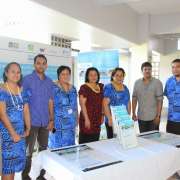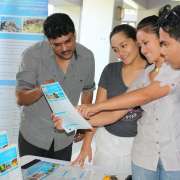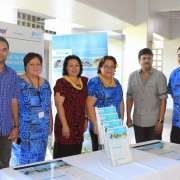Main menu
PACE-Net Plus at the UN International Conference on SIDS (Small Island Developing States)
With the PACE-Net Plus project, the European Union, which maintains a long standing relationship with the Pacific, aims to reinforce scientific, technological and innovation cooperation with the region and to promote the development of mutually beneficial partnerships, notably through Horizon 2020, the EU framework programme for multi-lateral research and innovation (and the largest research funding programme in the world).
At the same time, PACE-Net Plus represents an opportunity for Pacific Island Countries and Territories (PICTs) and European Overseas Countries and Territories (OCTs) to better address the science, technology and innovation (ST&I) areas that support regional development goals, to reinforce regional research capacities and networks, to better participate in bi-regional ST&I networks of global interest and, finally, to improve the regional cooperation and integration, as encouraged by the Pacific Plan 2005–2014 and recently reaffirmed by the Pacific Forum Leaders through the Framework for Pacific Regionalism.
This session will introduce Horizon 2020 as well as the PACE-Net Plus project, demonstrating the opportunities and benefits for SIDS member countries. In this context, the subject of innovation in developing countries will be presented. The session will conclude with an example of a regional Observatory for Environment (GOPS) and of a multi-lateral summit (Oceania 21) in the Pacific, that demonstrate the potential regional cooperation benefits from global research activities.
Agenda of the Side Event
| 19:00–19:20 | Horizon 2020, the EU Framework Program for Research and Innovation (Rado Faletic, PACE-Net Plus and INCONTACT2020) |
| 19:20–19:40 | PACE-Net Plus for ST&I cooperation, partnerships and biregional dialogue between EU and Pacific. (Jean-Francois Marini, IRD, coordinator of PACE-Net Plus) |
| 19:40–19:55 | Innovation and innovation policies in developing countries in the framework of PACE-Net Plus (Ludovico Alcorta, UNIDO) |
| 19:55–20:10 | The South Pacific Integrated Observatory for Environment and Terrestrial and Marine Biodiversity — GOPS (Bernard Pelletier, IRD, coordinator of GOPS) & O2C3 a new Oceanian Observatory on the Consequences of Climate Change (Victor David, IRD, coordinator of O2C3) |
| 20:10–20:30 | The Oceania 21 Summit and its recommendations (Anthony Lecren, Member of the Government of New Caledonia). |
PACE-Net Plus at the UN International Conference on SIDS (Small Island Developing States)






